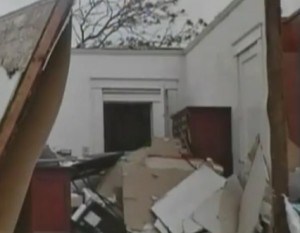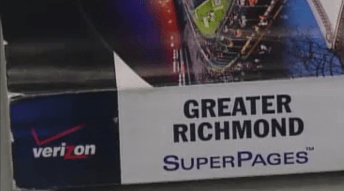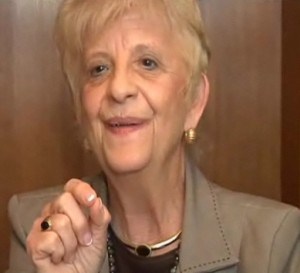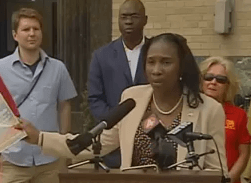
Storm Damage (WBRC)
A firestorm of criticism over reports of Alabama cable companies trying to charge customers for equipment lost or destroyed during April’s devastating tornadoes has forced some companies to rethink their policies, at least for this storm.
As Stop the Cap! reported earlier this week, some Alabama customers of Charter Cable and Bright House Networks were asked to pay the full value of cable boxes lost, damaged, or destroyed by the massive storms that struck last month. Some customers complained about fees in excess of $200 for the set top boxes. Fees for lost, stolen or damaged equipment are common at cable companies and customers are routinely asked to file insurance claims to cover the loss or damage.
But when tornadoes devastated several Alabama communities, several upset customers began taking their stories to the media, and now those policies are changing, at least for this storm.
Customers of Charter Cable have shared their stories with reporters at local newspapers and television stations, and a few are sharing them with Stop the Cap! Kelly, who requested we not publish her last name for privacy reasons, lost her home last month and is now living in Georgia. When she called to suspend service shortly after the storm, she was told she would either have to pay for her cable box or make an insurance claim on behalf of Charter Cable.
But Charter Cable tells Stop the Cap! that policy has now been changed.
“Charter will not charge customers for missing, destroyed, or damaged equipment as a result of the recent tornadoes,” said Dylan Hall, one of Charter’s communications specialists. “We adjusted our policy shortly after the tornado in response to the large-scale and catastrophic nature of this storm. This was the right thing to do for our customers. We understand that this is a difficult time for many in Alabama.”
After Kelly reached out to Charter once again earlier today, the company not only waived the box fee, it also credited her account for an entire month of service, resulting in a substantial refund she says will be a big help for her family.
“I greatly appreciate your website bringing this more attention,” Kelly says. “Earlier today, one of your readers who claims to work for Charter said I was making the story up, and it felt like being abused all over again.”
But after Kelly called Charter directly, things had changed.
“It was like a whole different company, and the representative I spoke with apologized at least six times and felt very bad about everything,” Kelly reports. “I want to go back to Alabama in the summer, and the fewer bad memories I have of the last several weeks, the better. This helps.”
 Hall believes customers like Kelly likely encountered the lost or damaged cable box fee because they called right after the storm, before the company adjusted its policy.
Hall believes customers like Kelly likely encountered the lost or damaged cable box fee because they called right after the storm, before the company adjusted its policy.
“Unfortunately, some time elapsed before our Care agents got word to adapt our equipment policy, as we have in the past during other disastrous storms,” Hall says. “So customers who called immediately following the storm were misinformed. The policy changed to reflect the need and Care agents conveyed that to customers. Our employees continued to delivered water, tarps and other supplies to storm victims and help the Red Cross out with financial aid. The policy was changed because it was the right thing to do.”
Bright House Networks has also changed their policies in light of the horrific storm damage.
 Karen Broach, regional vice president of operations for Bright House, reports the cable company has sent crews to assess damage and has automatically suspended billing for all customers it can identify were blown out of their homes by the storm:
Karen Broach, regional vice president of operations for Bright House, reports the cable company has sent crews to assess damage and has automatically suspended billing for all customers it can identify were blown out of their homes by the storm:
- Bright House Networks has proactively credited accounts of customers who experienced a loss of service(s) due to the storms.
- Bright House Networks took the initiative and completed a detailed walk out of the area to identify all known destroyed homes and we suspended their billing.
- This is important for two reasons, one is financial and the second is customer convenience. For example, if a customer subscribes to Bright House Networks Home Phone or High Speed Internet Service, this will preserve the customer’s phone number and email address so they can transfer it to their new residence.
- Suspended customer bills include suspension of equipment charges so customers can make contact with us at a time convenient to them to address their individual needs.
- Bright House Networks will not charge customers for equipment damaged or lost as a result of the storm.
- Bright House Networks never charges a disconnect fee – no matter what the reason.
Bright House customers with questions or problems can call 1-866-876-1872.
 Comcast, which delivers cable service in certain parts of Tuscaloosa and Huntsville, normally requires a police report or copy of an insurance claim for lost, stolen, or damaged cable boxes. But they too have changed their minds after noting the extent of storm damage.
Comcast, which delivers cable service in certain parts of Tuscaloosa and Huntsville, normally requires a police report or copy of an insurance claim for lost, stolen, or damaged cable boxes. But they too have changed their minds after noting the extent of storm damage.
Comcast has notified customers in the Tuscaloosa and Huntsville areas of the following policies:
- For consumers displaced from their homes due to the storms, their service may be placed on a temporary six-month “hold” status at no cost, which enables those with voice and data services to save their telephone numbers and email addresses.
- Equipment (such as converter boxes and cable modems) that was damaged by the storm may be exchanged at the local Comcast offices at no charge. Consumers should notify Comcast if equipment was lost in the storm and cannot be recovered. Although routine policy requires that a police report or insurance claim be filed on lost equipment, that requirement is waived for six months due to the extreme nature of the extensive storm damage. Customers will not be charged for the exchange or replacement of equipment under these circumstances.
- Customers who lost service will be automatically credited for that period of time. It is not necessary to notify Comcast for this credit, which will appear automatically on customers’ next bills. Customers who still do not have service after their power was restored should contact Comcast.
Stop the Cap! notes these are ongoing issues with some cable companies, and we’ve covered similar stories in other states where customers faced demands for payment of cable equipment lost in fires. We continue to urge cable companies to abandon lost/damaged box fees for incidents involving natural disasters or fires that are not the fault of customers. It’s good public relations and it is the right thing to do.
[flv width=”480″ height=”380″]http://www.phillipdampier.com/video/WBRC Birmingham Charter Cable Boxes 5-17-11.flv[/flv]
WBRC-TV in Birmingham shares the story of Cleon Spain, a Charter customer who was requested to pay more than $200 for his lost cable box before Charter changed its policies. (2 minutes)
 Verizon customers in Virginia are saying goodbye to automatic delivery of the printed edition of the White Pages after the State Corporation Commission gave the okay to end decades of directory deliveries on doorsteps across the state.
Verizon customers in Virginia are saying goodbye to automatic delivery of the printed edition of the White Pages after the State Corporation Commission gave the okay to end decades of directory deliveries on doorsteps across the state.

 Subscribe
Subscribe









